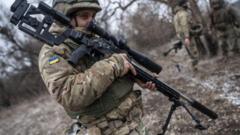A multinational force in Ukraine, dubbed the Multinational Force Ukraine (MFU), is being defined as a "reassurance force" rather than a peacekeeping force, according to defense and diplomatic sources. This newly proposed deployment primarily aims to solidify any ceasefire and promote lasting confidence within the country. The MFU, likely to consist of around 20,000 troops, would focus on providing air coverage and a naval presence in the Black Sea to facilitate trade. It’s noteworthy that this force may operate without entering Eastern Ukraine to avoid provoking Russia, as the Kremlin has voiced its opposition to foreign troops in the region.
Reassurance Forces Focus on Security, Not Peacekeeping in Ukraine

Reassurance Forces Focus on Security, Not Peacekeeping in Ukraine
Discussion surrounds the Western troop deployment in Ukraine, emphasizing security rather than traditional peacekeeping roles.
The underlying mission of the MFU is not to act as peacekeepers but to serve as a supportive entity for Ukraine, especially to deter future aggression from Russia. Unlike traditional peacekeeping forces which are impartial and often operate with the consent of both parties, the MFU would align itself firmly with Ukrainian interests, helping secure urban areas, ports, and vital energy infrastructure.
However, the force is not expected to actively monitor any ceasefire, with that responsibility falling on Ukrainian troops assisted by Western surveillance. Furthermore, the MFU will not operate as a "tripwire" force to deter potential Russian attacks, given the vast disparity in troop strength between Ukraine and Russia's military.
Current discussions are centered on how to equip Ukraine with necessary air support, including the potential provision of warplanes. Additionally, ensuring safe shipping in the Black Sea is also under consideration, focusing on both mine clearance and naval security presence. A significant question remains regarding the United States' involvement and whether it will offer any air or intelligence support to European-led missions. European allies are now strategizing independently, emphasizing their capability and coordination to secure Ukraine’s defense, while awaiting the US's potential reconsideration of its role. Ultimately, the future of this multinational effort hinges on the possibility of a ceasefire agreement, a prospect that many in Ukraine view with skepticism given Russia's ongoing military aggression.
However, the force is not expected to actively monitor any ceasefire, with that responsibility falling on Ukrainian troops assisted by Western surveillance. Furthermore, the MFU will not operate as a "tripwire" force to deter potential Russian attacks, given the vast disparity in troop strength between Ukraine and Russia's military.
Current discussions are centered on how to equip Ukraine with necessary air support, including the potential provision of warplanes. Additionally, ensuring safe shipping in the Black Sea is also under consideration, focusing on both mine clearance and naval security presence. A significant question remains regarding the United States' involvement and whether it will offer any air or intelligence support to European-led missions. European allies are now strategizing independently, emphasizing their capability and coordination to secure Ukraine’s defense, while awaiting the US's potential reconsideration of its role. Ultimately, the future of this multinational effort hinges on the possibility of a ceasefire agreement, a prospect that many in Ukraine view with skepticism given Russia's ongoing military aggression.



















